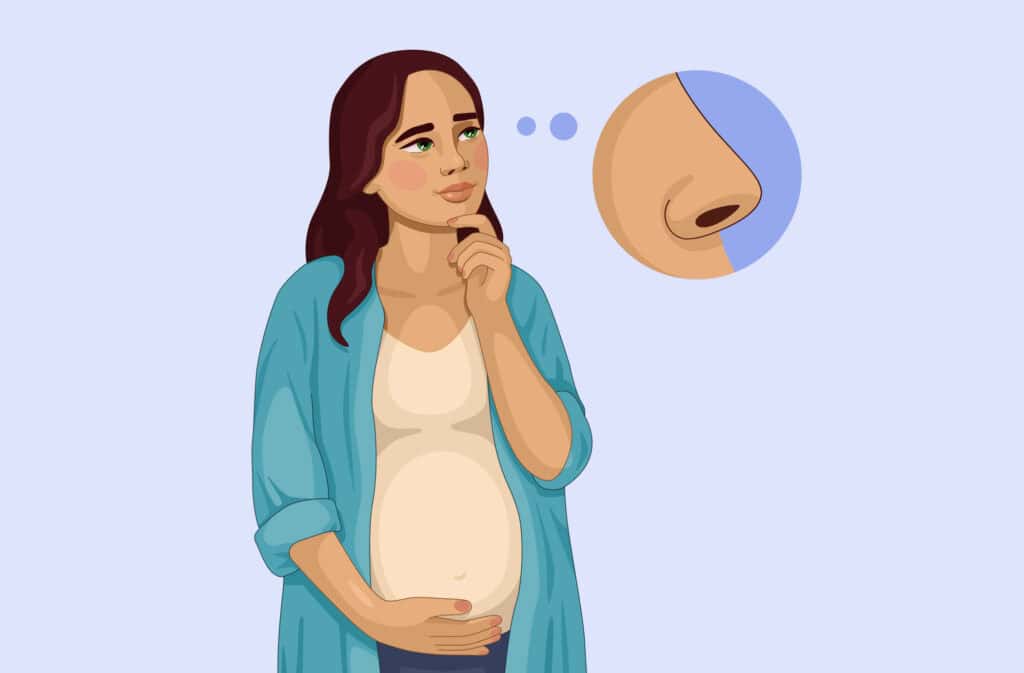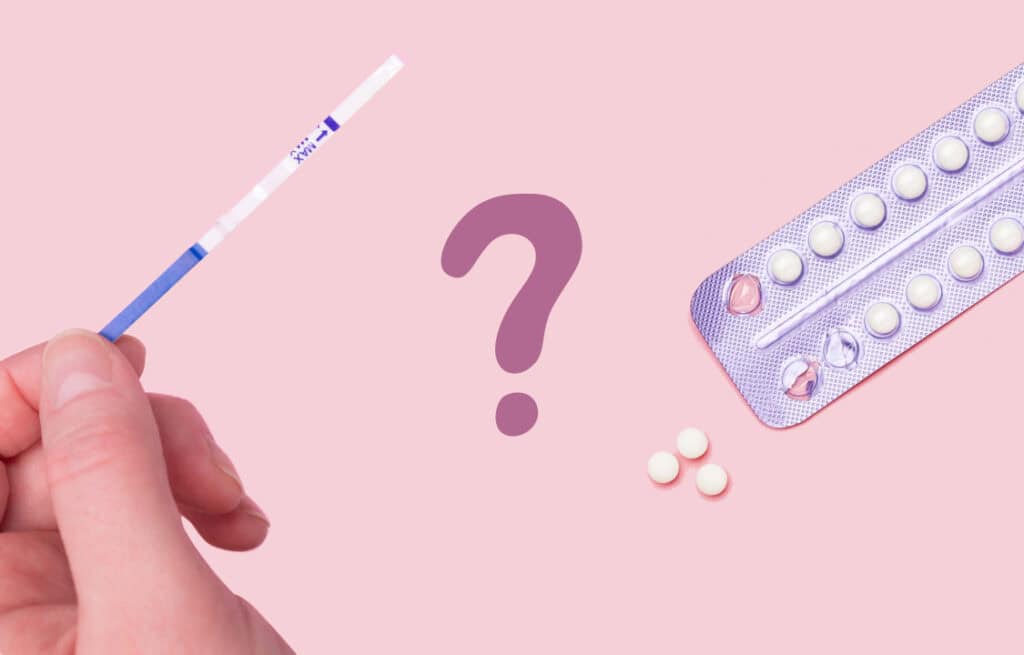Femia > Health Library > Pregnancy > Pregnancy health > Pregnancy nose: What causes it and when does it go away?
Pregnancy nose: What causes it and when does it go away?

- Updated Feb 10, 2025
- Published
CRAFTED BY HUMAN
Crafted by human At Femia, we provide accurate and up-to-date information at every stage of your journey, from trying to conceive, pregnancy and postnatal support. All content is created by a real person based on in-depth research and own professional experience. Femia ensures that you will receive expert advice, strict accuracy and a personalized approach from our authors/medical experts. Learn more about our editorial policy.
FACT CHECKED
Fact checked At Femia Health, we maintain the highest standards of editorial excellence in delivering content focused on helping you conceive, guiding you through pregnancy, and supporting you postpartum. Explore our content review principles to learn how we ensure the accuracy and quality of our health and lifestyle tips for every stage of your journey.
The swelling and enlargement of the nose often seen in pregnant ladies, also known as “pregnancy nose,” is a real symptom of pregnancy caused by hormonal changes. It starts in the second or third trimester and may last until a couple of weeks after you give birth. Pregnancy nose is associated with the enlargement of blood vessels and increased blood flow caused by extremely high levels of estrogen and progesterone. You might be able to combat it by drinking a lot of water and minimizing your salt intake.
Does your nose get bigger when pregnant? For some women, the answer is “yes.” This weird pregnancy symptom may not be as well-known as others, but TikTok has recently brought it to the spotlight.
If you, too, have been keeping yourself busy looking at pregnancy-nose before-and-after photos, you might have noticed that it gets worse as pregnancy goes on. This is because, just like anything else happening to your body while pregnant, pregnancy nose is caused by raging pregnancy hormones.
With Femia, you will get personalized insights every step of the way
What is a pregnancy nose?
Everybody seems to talk about swollen ankles or puffy hands that come with pregnancy, but a swollen nose is not that notorious. In fact, some of you might still wonder: what is pregnancy nose? Let’s break it down.
“Pregnancy nose” refers to a visible change in the size and appearance of the nose that some ladies experience during pregnancy. You might notice your nose becoming more prominent or rounded, especially around the tip or bridge.
The changes in appearance can vary from person to person. Your natural nose shape might just be a bit more pronounced due to the nasal tissue swelling.
Aside from the changes in shape, your nose might feel more sensitive or tender to the touch. Some women also experience a sense of fullness in the nose that sometimes prevents normal breathing, also known as nasal congestion.
👉Find out more: Are baths safe while pregnant? Tips for a relaxing, risk-free soak
When does pregnancy nose start?
Many soon-to-be-mamas, at this point, might be worried about getting a pregnancy nose. Why can’t it be the pregnancy glow instead? So, when does pregnancy nose start?
Pregnancy nose often starts being noticeable during the second or third trimester. This is when hormone levels, particularly estrogen and progesterone, reach their peak. But, this timing can vary, since hormonal fluctuations affect each woman differently.
Your experience with pregnancy nose is very personal. Some women may notice only a slight puffiness or changes in the nose, while others experience more significant swelling, with the nose appearing visibly larger. You might also feel your nose becoming congested, which is a benign medical condition known as pregnancy rhinitis.
What causes pregnancy nose?
It happens to many women, but why? What causes pregnancy nose? You can blame it on the pregnancy hormones, especially estrogen and progesterone.
Estrogen makes your blood vessels relax and expand in order to make room for the increased blood volume you and your baby are sharing. In fact, your body produces approximately 50% more blood and body fluids to accommodate your baby’s development during pregnancy.
Progesterone enhances the effect of estrogen and contributes to the increased whole-body and womb blood flow during pregnancy. As a result, your feet, ankles, legs, and other body parts might start to swell.
Why does your nose get bigger during pregnancy?
So, the blood flow and fluid retention increase— you’re probably familiar with how this affects the feet. But, why does your nose get bigger during pregnancy? The same principles apply.
Estrogen and progesterone increase circulation in the blood vessels of the nose. This higher blood volume causes the blood vessels in the nose to expand and fill with more fluid. As a result, the nasal tissues swell, which can make the nose appear larger or puffier.
These hormones also promote fluid retention, leading to more noticeable swelling in the face, including the nose. If you have more soft tissue in your nose, you might experience more swelling, simply because there is more space for blood to be stored.
Does pregnancy nose go away?
Most symptoms of pregnancy are only temporary. Does pregnancy nose go away, too? Don’t worry—you won’t be needing a nose job after having your baby. Even if you are dealing with this symptom right now, it will likely pass soon after giving birth.
For most women, the swelling starts to lessen relatively quickly. The hormones that cause the pregnancy nose normalize within a few weeks after delivery. Most women notice a decrease in nasal swelling within a few days to a couple of weeks after giving birth.
What to expect
It’s important to understand that swelling will not disappear overnight. It’s a gradual process. Give your body the time it needs to go back to how it was. Hormonal fluctuations can continue after giving birth, especially if you are breastfeeding.
You might be focused on body changes like weight loss and a swollen nose, but remember to allow time for recovery and emotional well-being.
If nasal swelling persists beyond a few weeks or if there are concerns about nasal congestion or discomfort, make sure to reach out to your trusted healthcare provider to rule out any underlying issues.
👉Find out more: Best positions to relieve gas while pregnant for immediate comfort
Treatments for pregnancy nose during pregnancy
If you develop a pregnancy nose, don’t worry. There are a few things you can do to make it a bit better. Here is how to reduce facial swelling naturally:
- Apply a cold compress. You might reduce swelling by placing a cold, damp cloth or an ice pack wrapped in a towel on the nose.
- Remember to stay hydrated. Drink a lot of water to flush excess sodium from your body and reduce water retention.
- Go easy on the salt. Minimize your sodium intake, and avoid adding additional salt to your meals. Sodium binds water, which promotes fluid retention and swelling.
- Limit caffeine and sugary drinks. Caffeine and glucose can contribute to dehydration, which might exacerbate swelling.
- Increase your potassium intake. Potassium can help balance sodium levels. Eat foods such as bananas, sweet potatoes, spinach, and avocados.
- Consume a lot of fruits and vegetables. A diet rich in fruits and vegetables provides essential vitamins and minerals, helps maintain hydration, and can reduce swelling. Aim for a variety of colors to maximize nutrient intake.
- Gentle exercise. Light physical activity, such as walking, can improve circulation and help reduce swelling. Always talk with your healthcare provider before starting any new exercise routine right after giving birth.
- Use extra pillows. Using extra pillows to elevate your head while sleeping can help reduce nasal swelling and congestion. This position prevents fluid from accumulating in the nasal tissues during the night.
- Stay away from environmental triggers. Try to limit exposure to smoke, strong odors, and other allergens.
With Femia, you will get personalized insights every step of the way
Questions from Femia community
Is my pregnancy nose a sign of other complications?
A pregnancy nose is typically harmless. It is primarily caused by normal hormonal changes and increased blood flow during pregnancy. Although usually not a sign of other complications, talk with your trusted healthcare provider if swelling becomes severe. Pregnancy nose can sometimes come hand in hand with pregnancy rhinitis and allergies or infections.
Can I prevent pregnancy nose?
Unfortunately, a pregnancy nose cannot be fully prevented. It is largely caused by hormonal changes that are a normal part of pregnancy. However, there are strategies you can try to minimize the swelling: stay hydrated, avoid salt, apply cold compresses, and elevate your head while sleeping.
Will pregnancy nose happen with every pregnancy?
No; you might not develop a pregnancy nose every time you are pregnant. Each pregnancy is unique, and the way your body responds to hormones can change. Some women may experience pronounced nasal swelling in one pregnancy but not in another. Factors such as age, health status, and whether the pregnancy is with multiples (twins or more) can influence these hormonal fluctuations.
The bottom line
Thanks to social media, many soon-to-be-mamas are worried about having a pregnancy nose. So remember, there is no reason to worry. Nasal tissue swelling is a completely normal symptom caused by hormonal changes that are necessary to support your developing baby..
Although you can’t prevent a pregnancy nose, you can try to minimize its appearance by drinking plenty of water, applying cold compresses, and sleeping with your head elevated. But, even if your nose gets bigger now, it will likely shrink back to normal soon after giving birth. When you have your baby in your arms, your nose size will likely be the last thing on your mind.
References
- Kelly, Kathleen. “Is Pregnancy Nose Real? Explaining Ear, Nose and Throat Issues When You’re Expecting.” The Ohio State University, 8 May 2023, health.osu.edu/health/ob-gyn/pregnancy-nose.
- Kumar, Pratap, and Navneet Magon. “Hormones in Pregnancy.” Nigerian Medical Journal: Journal of the Nigeria Medical Association, vol. 53, no. 4, Oct. 2012, pp. 179–83. PubMed, https://doi.org/10.4103/0300-1652.107549.
- Mata, Karina M., et al. “Adaptive Increases in Expression and Vasodilator Activity of Estrogen Receptor Subtypes in a Blood Vessel-Specific Pattern during Pregnancy.” American Journal of Physiology-Heart and Circulatory Physiology, vol. 309, no. 10, Nov. 2015, pp. H1679–96. journals.physiology.org (Atypon), https://doi.org/10.1152/ajpheart.00532.2015.
- Resnik, Robert, et al. “The Effect of Progesterone on Estrogen-Induced Uterine Blood Flow.” American Journal of Obstetrics & Gynecology, vol. 128, no. 3, June 1977, pp. 251–54. ajog.org, https://doi.org/10.1016/0002-9378(77)90617-2.
- “Swelling During Pregnancy.” American Pregnancy Association, 27 Apr. 2012, americanpregnancy.org/healthy-pregnancy/pregnancy-health-wellness/swelling-during-pregnancy/.

Did you know your clitoris can be the key to unlocking your orgasm? Follow this guide for enhancing your clitoral satisfaction, and maximizing your sexual experience.

Do you still ovulate on birth control? Learn how hormonal contraceptives prevent pregnancy, their effects on ovulation, and what to expect.

Learn how ovulation affects your emotions and triggers mood swings. Discover the causes, common symptoms, and treatment methods to manage your mood swings effectively.

